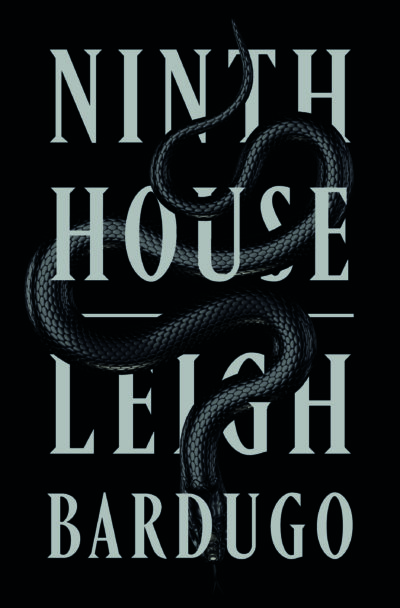Advertisement
Review
The World Of 'Ninth House' Has Ghosts And Magic, But Greed Is The Real Evil

Galaxy “Alex” Stern has always been able to see ghosts, or “the quiet ones” as she calls them. They surround Alex relentlessly in faded polaroid color with gory clues about their death. Her new classmates at Yale refer to them as “the Grays” because they can see a grayish visage of the dead, but only with the temporary help of a potion or a spell. The Grays aren’t supposed to be able to touch the living, so long as the guardians of Lethe House keep them from interfering with the magic rituals of Yale’s Ancient Eight secret societies. Yet when Alex starts to unravel the motives behind the murder of a local New Haven woman, she finds that ghosts are not the scariest thing in town.
In author Leigh Bardugo’s previous works for young adults — the "Shadow and Bone" trilogy and "Six of Crows" duology — she constructs fantastical kingdoms with otherworldly magic, imagined histories, and hairpin tight plots. "Ninth House" is her first novel for adults, but it still incorporates all of the above (minus the kingdoms). However, it’s coated in a layer of grit that comes with the messiness of the real world. Alex is haunted by the metaphorical demons of her past just as much as she’s haunted by Grays. "Ninth House" unpacks the ugly effects of trauma and the gall of people in power. Magic aside, the realistic setting forces the reader to confront these truths head on rather than through a layer of allegory.
The richness of the magical world Bardugo builds in "Ninth House" is structured around the real secret societies at Yale, where Bardugo herself attended. Skull & Bones is the most famous of these societies (whose alumni include three former presidents), but Bardugo also includes the lesser-known but no less powerful Scroll & Key, Berzelius, St. Elmo’s, Book & Snake, Wolf’s Head, Aurelian and Manuscript. In this world, the Ancient Eight harness magical power to facilitate their social and political influence and the wealth that they’ve accumulated in the real word with predatory capitalism.
When you look at the windowless clubhouses for these societies at Yale (which they affectionately call “tombs”), it’s no wonder they have long been accused of the occult. "Ninth House" reflects on the myriad positions of power that many members ascend to in the real world — "They’ve run everything from the United Nations to Congress to The New York Times to the World Bank. They’ve fixed nearly every World Series, six Super Bowls, the Academy Awards, and at least one presidential election,” as her mentor Darlington says, “They welcome all of the conspiracy theories and tinfoil-hat-wearing loons... Because what they’re really doing is so much worse.”
Only in fiction would someone appoint an impartial party to overlook the proceedings of groups amassing such power. When Alex becomes the newest member of Lethe, the ninth house that was created to oversee the Ancient Eight, she and the reader both know that the members of these societies aren’t used to anyone curtailing their dangerous ambition.
As the novel progresses, Bardugo builds a mounting sense of dread that something traumatic happened in Alex’s past. Characters are referred to in past tense, snippets of bloody crime scene memories are squashed to the side, and Alex sidesteps rude classmates with nonchalance yet flinches at butterflies. The reader doesn’t know if there’s truth to the assumptions that she’s a recovering alcoholic, drug addict, or both. Bardugo obfuscates the past while dropping allusions that settle like acid in the stomach.
The alternating perspectives between Alex and Daniel “Darlington” Arlington (the senior Virgil to her freshman Dante) help achieve this narrative distance until the opportune moment when the reader can piece the backstory together for themselves. Early on, Alex spits, “All you wise men of Lethe with your spells and your chalk and your books? Where were you when the dead were following me home?” These Yalies had been tracking Alex ever since Child Protective Services marked her record for paranoid “delusions” about ghosts, but they certainly weren’t stepping in to tell her there were simple incantations that she could say for the ghosts to leave her alone. Alex is acutely aware that Yale never took interest in the ramifications of her abilities until she could be useful to them. She suffers irreparable consequences.

Despite Alex’s self-preservation modus operandi, she becomes determined to solve the murder mystery of Tara Hutchins, a young drug dealer who got in way over her head. Alex reflects that she would have met a similar fate as Tara, given enough time without the opportunity of Yale. The purported murderer is Tara’s boyfriend, but Alex finds too many ties to the Ancient Eight to be coincidental. Even before this incident, Alex suspects the Ancient Eight are not any more refined than the drug abusing company she used to keep.
The book opens with a gruesome ritual that involves cutting open an unsuspecting paranoid schizophrenic to predict the outcomes of the fiscal quarter, something they have done four times a year since the societies’ founding. “Too many powerful people rely on what the societies can do,” Darlington says when Alex questions why they can’t stop this morally corrupt practice. This first glimpse of their operations opens up a sinister line of logic that’s followed throughout the novel. Even though it’s Alex’s job as a member of Lethe to make sure the societies aren’t abusing their power, whenever Alex catches them doing something morally dubious, they try to get on her good side with bribes of money, power and future favors.
If body horror is one form of perfunctory magic for the societies, it’s not surprising that the societies use magic to manipulate the people surrounding them. At a debaucherous Halloween party at Manuscript’s tomb, Manuscript members drug everything from the drinks to the food to the fog machines so the partygoers will leave their senses. (That chaotic energy will power their magic for the year to come.) This party and its consequences are eerily reminiscent of another Yale society, Brett Kavanaugh’s Truth and Courage.
Badugo postulates that even a world of magic can’t shield its most vulnerable populations. Like our world, white men would hoard that particular wealth for themselves. After narrowly escaping a fate like Tara’s, Alex would have every excuse to take the easy route. She could ignore the malicious malpractices of her classmates in favor of a simpler, more comfortable life. But she knows that, “Peace was like any high. It couldn’t last. It was an illusion… Only two things kept you safe: money and power.” Now all she has to do is wield the power she was born with against all the money in the world.
